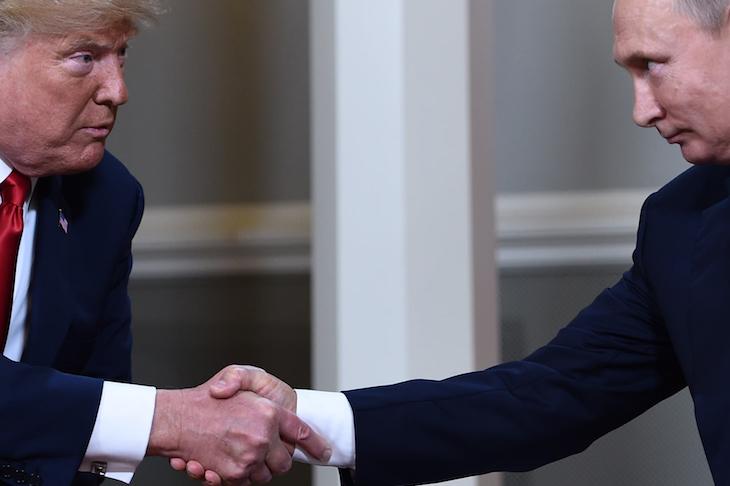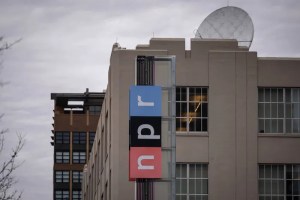History somehow isn’t moving toward its predetermined end, and this has driven Western liberals completely mad. The theatrical overreaction to Donald Trump’s joint press conference with Vladimir Putin in Helsinki is just the latest proof. Before the Trump-Putin summit, pundits warned that Trump might recognise Crimea as Russian territory. He did nothing of the sort. But he did give Putin the benefit of the doubt when the Russian leader, in a carefully chosen phrase, said the ‘Russian state’ had not interfered in the 2016 election.
Trump’s equivocation—‘My people came to me, Dan Coates came to me and some others, they said they think it’s Russia. I have President Putin. He just said it’s not Russia. I will say this: I don’t see any reason why it would be’—touched off a media furor. Trump, the mucho macho press corps declared, was weak. He was ‘submissive,’ said Sen. Cory Booker. The New York Times ran an animated short depicting the Russian and American leaders as homosexual lovers—evidently a little gay baiting is virtuous as long as it’s in a good cause.
This neurotic, sexualised imagery would almost be enough to make a Freudian of anyone. And then there was John Brennan, the former CIA director, whose fervour was such that an older form of medical quackery would have diagnosed it in grossly misogynistic terms as an ailment of the female reproductive system. ‘Donald Trump’s press conference performance in Helsinki rises to & exceeds the threshold of “high crimes & misdemeanors,”’ he thundered, or rather, tweeted. ‘It was nothing short of treasonous.’
Donald Trump’s press conference performance in Helsinki rises to & exceeds the threshold of “high crimes & misdemeanors.” It was nothing short of treasonous. Not only were Trump’s comments imbecilic, he is wholly in the pocket of Putin. Republican Patriots: Where are you???
— John O. Brennan (@JohnBrennan) July 16, 2018
Nothing short? Was Brennan, a man whose nomination to head the CIA was filibustered in part on account of his support for drone warfare that might involve killing American citizens, really saying that President Trump should be prosecuted and perhaps face capital punishment for betraying his country? In short, no: Brennan was just emotionally venting, and presumably if he took a few deep breaths and reflected for a moment, he would conclude that for an elected president—the constitutional head of the executive branch of the United States—to express doubt about the work of the intelligence agencies that serve him is not, in fact, treason. Nor is it a high crime or even a misdemeanour.
At least, one hopes that Brennan understands the fundamental law of the country well enough to know that. But perhaps he doesn’t: one thing the Trump era has revealed is just how deep the ignorance and contempt for the Constitution run among the American establishment and elite centre-left, who sometimes do seem to consider ‘treason’ to be anything injurious to their own prestige. To them, the ‘intelligence community’ simply is America, and for a merely elected leader to fail to show due deference to the higher authority of the expert bureaucracy is lese majeste.
In a different idiom, Donald Trump is a heretic—or worse, an infidel. He does not believe in the holiness, immaculate conception, or infallibility of the intelligence community and its ‘product.’ He may even remember when that community vouched for the presence of non-existent weapons of mass destruction in Iraq and gave George W. Bush the unnecessary war he wanted. Maybe Trump has heard about the intelligence community’s stellar record with respect to Russia as well, such as its mid-1980s predictions that the Soviet Union would be a peer economic and military competitor to the U.S. as far into the 1990s as sober forecasters could look. In 1979, the CIA was convinced that the Shah of Iran was going to be around for a long time, too.
The notable failures of U.S. intelligence over the decades do not mean that the intelligence community is wrong to point its fingers at the Kremlin for meddling in the 2016 election, using everything from Facebook ads to spearfishing ploys to gain access to Democratic Party officials’ email. Trump certainly bristles at the idea that such interference might have given him the edge in his contest with Hillary Clinton, and pride, where the president is concerned, seems sufficient motive for him to dismiss the conclusions of the agencies that work for him. Whether that’s dangerously irresponsible is for voters to decide, and either way they will act accordingly in 2020. If Congress in the meantime feels that foreign powers are a threat to the integrity of our elections, stronger laws against foreign influence in this country will be needed. But such laws will not be able to single out Russia: think tanks and lobbies with intimate connections to Middle Eastern despots who make Vladimir Putin look like Aristides the Just will also have to take the hit. The double standard according to which Moscow is anathema but Riyadh is treated like an honorary democracy will have to fall. And there’s no chance of that.
There is something more than pride to Trump’s rejection of even the most plausible accusations against Putin’s government (and the non-governmental entities that may serve it). The missing element is not the ‘pee tape,’ which occupies the same space in the elite liberal imagination that Obama’s birth certificate occupies in the mind of many a right-wing populist. It’s the cold core reality that Donald Trump subscribes to a vision of the world very different from that of his elite centre-left opponents. They see Russia as a symbol of hopes destroyed, of a post-Cold War order aborted by the rise of an authoritarianism that defies the logic of the end of history. Putin’s Russia is hated in ways that the fundamentalist Saudi Arabia is not because Russia is moving backwards. Liberalism’s ideological victories are supposed to be permanent, and its entire mythology collapses if time’s advance is no longer synonymous with progress.
In the 19th century, Russia was the last great autocracy, the final archaic survival of the ancien regime, or something even older, that impeded the fulfilment of the French Revolution’s ideals upon the Eurasian continent. The Bolshevik Revolution was supposed to be the triumph of Enlightenment in darkest Russia, but once the fruits of Lenin and Stalin became more than most liberals could defend, a new narrative was necessary. The U.S. fought the Cold War for solid Realpolitik reasons—a single power dominating the Eurasian continent was still unacceptable for U.S. security— but the realist Cold War was accompanied by an ideological liberal crusade. And when at last the Soviet Union collapsed, the Realpolitik of U.S. policy vanished, and the liberal crusading remained.
Donald Trump is not a liberal crusader. He does not think in terms of the advance of liberalism. On the contrary, he has consistently campaigned against economic globalisation and the cultural (or multicultural) left—those are his enemies, and to the extent he is fighting ideological battles, they are not for liberal internationalism, but against cultural and economic anti-nationalism. Putin and Russia are not responsible for any of the rip-offs (as he sees them) that incense Trump, terrible trade deals and selfish Nato allies. So Trump thinks he can cut a deal with Putin, and he’s eager to do so in order to turn his attention to the things that really matter to him politically, the things that got him elected. If the American electorate wanted an anti-Russian Republican, after all, they would have elected Mitt Romney. Instead they wanted an anti-liberal one, and they—not Putin—elected Donald Trump.


















